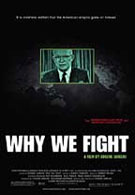The title of Eugene Jarecki's new documentary, Why We Fight, winner of the Grand Jury Prize at Sundance, is taken from famed director Frank Capra's series of World War 2 propaganda films. Back then, things seemed much simpler. We were facing brutal, jackbooted, genocidal Nazis, treacherous buck-toothed, goggle-eyed Japanese, and that ridiculous, jut-jawed Hitler wannabe, Mussolini. We were fighting demons, or, at the very least, we were convinced that we were. Wartime Disney cartoons such as "Der Fuehrer's Face" marshaled the powerful forces of ridicule against the Axis powers. In order to defeat our enemies, we mobilized our immense industrial resources, and no sooner were the Axis powers defeated, there was the USSR to contend with. Out of all this arose what Dwight Eisenhower called, in his final speech as President, the "military industrial complex''. "The potential for the disastrous rise of misplaced power exists and will persist, he said. "We must never let the weight of this combination endanger our liberties or democratic processes."
So here we have the underpinnings for Why We Fight, a documentary covering much of the same territory as Michael Moore's Fahrenheit 9/11, but in a kinder, gentler, less obviously self-serving manner than Mr. Moore's pseudo-populist hatchetry. The film clearly takes aim at the Bush administration, making the obvious point that governments do not state their intentions clearly or truthfully to their citizens. Nor can they. As has been noted since Kautilya, adviser to an ancient Indian king, stated that diplomacy is really a subtle act of war, a series of actions taken to weaken an enemy and gain advantages for oneself, all with an eye toward eventual conquest, a nation's foreign policy may be viewed as a series of preliminary movements toward war, or the threat of war. One can convincingly argue that the actions of a nation are not subject to rules of individual ethics or morality. Must break eggs to make omelets, and all that.
The creators of Why We Fight make an effort to be even-handed. Paul Wolfowitz, former Deputy Secretary of Defense, sometimes know as "the velociraptor", and Weekly Standard Editor William Kristol speak up for the right, Gore Vidal for the elitist left. I couldn't help thinking that when he grandiloquently stated that Americans can't remember anything before Monday morning, that Vidal might be referring to a personal weekend tete a tete with a fine vintage.
There is the touching story of Wilton Sekzer, a retired police officer whose son died in the World Trade Center collapse. We see the bereaved father yearn for revenge against Saddam Hussein, and work hard for a remembrance of his son to be delivered to Iraq, only to come to believe that there was no clear connection between Saddam and 9/11. Sekzer proves an unforgettable example of honesty, humanity, and forthrightness.
We hear from two anonymous Stealth Bomber pilots who dropped the "smart bombs" that signaled the start of the second Gulf War, and learn that our smart bombs were actually dunces. A now-retired Air Force office shares her disillusionment with the manner in which intelligence "information" was used to justify the Iraq war. There are interviews with regular folks, many of whom seem (surprise!) uncertain about what we are doing in Iraq, and a rousing song by the U.S. Army Chorale. There's overkill here: in incorporating so much stock footage, and resorting to every documentary film trick and chestnut since Movietone News, Director Jarecki fails not only to answer the question posed by the title, which is eminently forgivable, since the question may be unanswerable, but dilutes any real attempt to take a crack at it. There are too many talking heads, there is too much filler, and I found my attention wandering at times. Why We Fight</> is in some ways a bomb, but still, all in all, a smart bomb.
Your Daily Blend of Entertainment News

